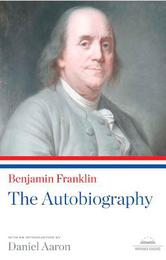
|
Benjamin Franklin: The Autobiography: A Library of America Paperback Classic
Paperback / softback
Main Details
| Title |
Benjamin Franklin: The Autobiography: A Library of America Paperback Classic
|
| Authors and Contributors |
By (author) Benjamin Franklin
|
|
Introduction by Daniel Aaron
|
| Physical Properties |
| Format:Paperback / softback | | Pages:230 | | Dimensions(mm): Height 203,Width 130 |
|
| ISBN/Barcode |
9781598530957
|
| Classifications | Dewey:B |
|---|
| Audience | |
|---|
|
Publishing Details |
| Publisher |
The Library of America
|
| Imprint |
The Library of America
|
| Publication Date |
6 January 2011 |
| Publication Country |
United States
|
Description
Famous as a scientist, statesman, philosopher, businessman, and civic leader, Benjamin Franklin was also one of the most powerful and controversial American writers of his time. He has been a subject of intense debate ever since- to Matthew Arnold, he exemplified "victorious good sense"; to D. H. Lawrence, he was "the first dummy American." Franklin's classic Autobiography, one of the great foundational works of American literature, is his last word on his most remarkable literary invention-his own invented persona, the original incarnation of the American success story. For almost thirty years, The Library of America has presented America's best and most significant writing in acclaimed hardcover editions. Now, a new series, Library of America Paperback Classics, offers attractive and affordable books that bring The Library of America's authoritative texts within easy reach of every reader. Each book features an introductory essay by one of a leading writer, as well as a detailed chronology of the author's life and career, an essay on the choice and history of the text, and notes. The contents of this Paperback Classic are drawn from Benjamin Franklin- Autobiography, Poor Richard, & Later Writings, volume #37B in the Library of America series. It is joined in the series by a companion volume, #37A, Benjamin Franklin- Silence Dogood, The Busy-Body, & Early Writings. Both volumes were edited by J. A. Leo Lemay.
Author Biography
Benjamin Franklin, statesman, philosopher, and man of letters, was born in Boston in 1706 of Protestant parents. He entered Boston Grammar School when he was eight and later attended George Brown Ell's school. When he was twelve his father apprenticed him to his half-brother James as a printer. James was later the publisher of the New England Courant, where Franklin's first articles, The Dogood Papers, were published before he was seventeen. He went to Philadelphia in 1723 and pursued his trade of printer. He was befriended by William Keith, Governor of Pennsylvania, who offered to help the young man get started in business. Franklin left for England, where he hoped to arrange for the purchase of printing equipment. Arriving in London in 1724, he was soon deserted by Keith, and again turned to printing for a livelihood. His privately printed Dissertation on Liberty and Necessity, Pleasure and Pain (1725) introduced him to leading Deists and other intellectuals in London. A year later, he returned to Philadelphia, and by 1730 he had been appointed public printer for Pennsylvania. In 1731 he established the first circulation library in the United States; in 1743-44, The American Philosophical Society. In 1748 he retired from the trade of printer but continued to advise and back his partner and to draw profit from the business. Poor Richard's Almanack was his most spectacular success as a publisher, having gone through numerous editions and been translated in many languages. During the next thirty-five years he devoted himself largely to politics and diplomacy, but still wrote and engaged in scientific ventures. He resigned as Minister to France in 1785, returned to America, and was elected President of the Commonwealth of Pennsylvania. Still concerned with the rights of the individual, he published papers encouraging the abolition of slavery. He died in Philadelphia in 1790.
Reviews"Franklin's is one of the greatest autobiographies in literature, and towers over other autobiographies as Franklin towered over other men." -William Dean Howells
|